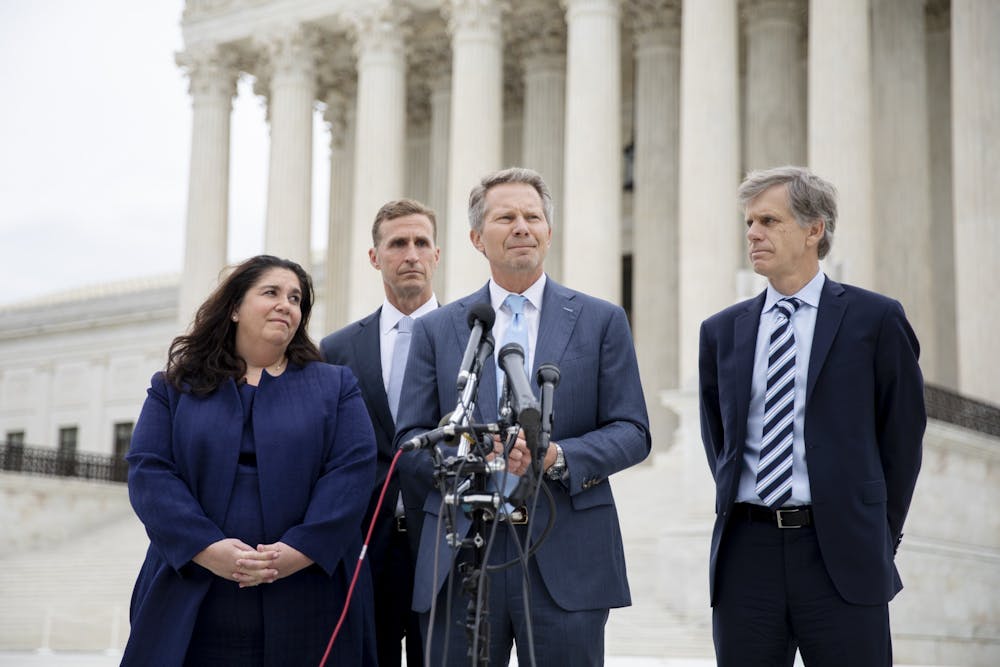Other cases that have set the precedent for race-conscious admissions include Grutter v. Bollinger, a 2003 case where a student sued the University of Michigan Law School for its use of race as a factor in admissions, which the court ruled as constitutional.
In another 2003 case, Gratz v. Bollinger, two white students — who were denied admittance to the University of Michigan's College of Literature, Science, and the Arts — sued the university. The Court ultimately declared the school's specific use of race-conscious admission to be unconstitutional because it was not narrowly tailored enough.
Sarah Hinger, a senior staff attorney for the American Civil Liberties Union, said that these cases clarified again that universities have a compelling interest in pursuing diversity in their student body.
"They indicated that race can only be considered as a part of a wholistic admissions process as one factor among many and not an independent deciding factor, effectively," she said.
The Bakke decision has been upheld in the U.S. Supreme Court in many cases, but Shaw said that there is confusion among the public and the justices themselves about the rationale for affirmative action and diversity.
"What is under attack though, is any and all efforts to engage in conscious efforts to admit Black and brown students to institutions of higher education," he said.
The current case between UNC and SFFA began with a federal lawsuit from SFFA in 2014. After an eight-day trial starting in November 2020, a federal district court later ruled in UNC's favor in October 2021.
SFFA appealed the case to the U.S. Supreme Court, and in January 2022, their petition was granted and the case was consolidated with a similar case between SFFA and Harvard University. The cases were later separated in July 2022. The Supreme Court heard oral arguments in the Students for Fair Admissions v. University of North Carolina case in October 2022, and the decision is expected this month.
The Affirmative Action Coalition at UNC has been advocating for affirmative action at UNC since September 2022.
Sarah Zhang, the internal affairs and media chair for the organization, said SFFA's arguments claim affirmative action discriminates against both white and Asian American applicants — a concept the coalition is working to advocate against.
"It really drives a wedge between the Asian American community and other minorities that benefit from affirmative action," they said.
She said that the coalition has been working with other campus organizations that have made affirmative action a core part of their DEI mission to advocate for the policy.
To get the day's news and headlines in your inbox each morning, sign up for our email newsletters.
Hinger said that schools have been looking at and need to continue ways to ensure that their educational opportunities are open to all students and that there is an inclusive environment.
"Collectively, people do want to ensure that people of every race have the ability to obtain a quality education, and so those values persist, I think, regardless of what the Supreme Court might say here, and I think that's very important for us to recognize and hold on to," she said.
@elizabenbow | @dailytarheel
university@dailytarheel.com
___
The Daily Tar Heel has been covering the Students for Fair Admission v. UNC lawsuit since it was filed in November 2014.
We’ve covered the entire legal pathway — the original filing, a 2016 ruling in favor of affirmative action, the first hearings, the beginning of the trial, the lower court rulings, the U.S. Supreme Court taking on the case, the split of the Harvard University and UNC cases and the decision itself.
The Daily Tar Heel sent three editors — Liv Reilly, Ira Wilder and Preston Fore — to the U.S. Supreme Court in October 2022 to cover the oral arguments in the case, and then covered student responses to those arguments.
We’ve covered how it might impact employment and the history of precedent-setting affirmative action cases.
We covered the foundation of UNC for Affirmative Action and the Affirmative Action Coalition, a group that organized events and forums leading up to the decision. When civil rights leaders came to Chapel Hill less than a month before the decision, we covered the event.
As updates arise in UNC’s response to the Supreme Court’s decision, we will be there, covering them.
Eliza BenbowEliza Benbow is the 2023-24 lifestyle editor at The Daily Tar Heel. She has previously served as summer university editor. Eliza is a junior pursuing a double major in journalism and media and creative writing, with a minor in Hispanic studies.



